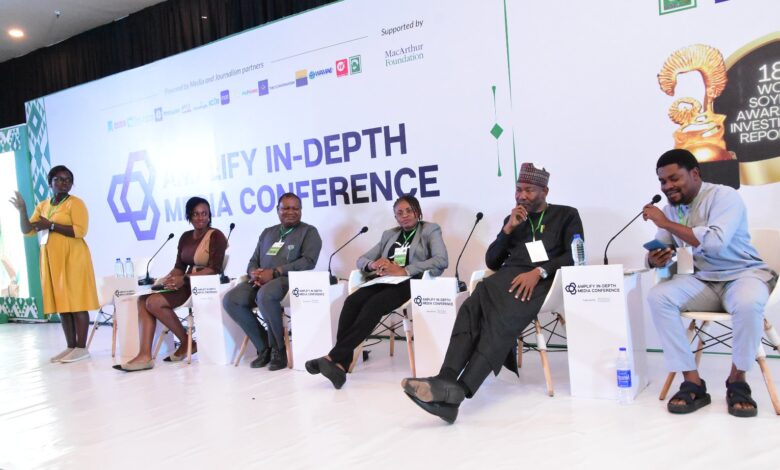Journalists, Scholars Converse On Media Sustainability At Amplify In-Depth Media Conference
Panelists agreed that collaboration between media practitioners and teachers could make universities train students with the skills needed in the labour market as the times continue to change.

As part of contributions to the discourse on media sustainability, panelists at the ongoing Amplify In-Depth Media Conference organised by the the Wole Soyinka Centre and 19 others under the Media and Journalism (MAJ) cohort of the MacArthur Foundation which includes HumAngle, have proffered ways the media business can remain relevant and profitable in the world today.
The professionals shared their insights in a panel titled “Media Sustainability and the Town and Gown Business”, moderated by HumAngle’s Investigations Editor, Kunle Adebajo.
Professor Pate, a renowned media scholar and Vice Chancellor, Federal University Kashere, Gombe State, said economic independence determines editorial independence.
He said the new unbundled curriculum for students of mass communication is tailored in a way that media students will learn how social issues like conflict shape how journalists operate in the world today, and also allow them to choose a particular specialty early on.
In its effort to revitalise the Nigerian university system, the regulatory body the National Universities Commission (NUC) had unbundled the Mass Communication field of study into several fields like Public Relations, Media Studies, Journalism and Media Studies, Advertising, Broadcasting, Film and Multimedia Studies, Development Communication Studies, and Information and Media studies, he explained.
He also said there is a need to change the psyche of the lecturers who will teach the unbundled courses.
Dr Chinedu urged media practitioners to put sustainability forward. She said the job markets should collaborate with media scholars to know the skills they need, as that would help them train students in that way.
The university lecturer said they have new courses like media entrepreneurship and integrated mass communication that will also help their students understand the business of the media.
She emphasised the need for journalism students to be trained on how to go out of their comfort zones, and ask their audience the type of news they prefer, looking at other demographic data like gender and age group.
Corroborating Dr Chinedu’s stance, Pate said media economics and management is also a course they have introduced in the new curriculum. The aim of the course is to teach students how to engage in journalism in a way that makes them relevant in today’s world.
On his part, Theophilus Abbah, Director of Daily Trust Foundation, narrated how he engaged staff of Daily Trust newspaper on how to thrive in an environment where breaking news does not matter.
He also stressed the need for news to be broken down to everyone’s level, citing examples with the Teen Trust, a weekly publication for young people on Nigeria’s Daily Trust newspaper.
Dr Abbah said students need to be trained on how to write business plans. He said it is important in any media organisation that wants to make money out of the business.
He noted that journalism students must also be trained on how to create content people can pay for. These are contents that add value to the audience, he said.
Sharon Ijasan, a senior correspondent at TVC expressed her appreciation to the Wole Soyinka Centre for Investigative Journalism for providing a platform for her to thrive in her career as a journalist.
Ijasan, encouraging young journalists on capacity building, continued by saying there is no year that passes without her participating in a training. She also highlighted some challenges she faces with reporting mainly on education, such as the willingness of department heads to trust her enough to sit in while classes are ongoing.
Support Our Journalism
There are millions of ordinary people affected by conflict in Africa whose stories are missing in the mainstream media. HumAngle is determined to tell those challenging and under-reported stories, hoping that the people impacted by these conflicts will find the safety and security they deserve.
To ensure that we continue to provide public service coverage, we have a small favour to ask you. We want you to be part of our journalistic endeavour by contributing a token to us.
Your donation will further promote a robust, free, and independent media.
Donate HereStay Closer To The Stories That Matter




